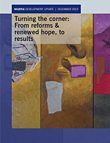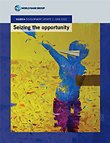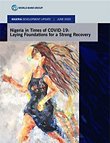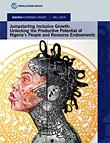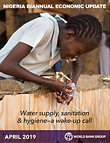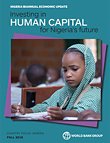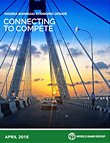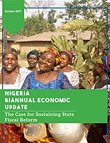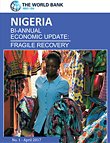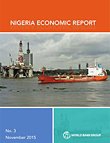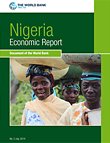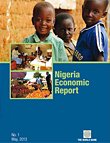The Nigeria Development Update (NDU) is a biannual World Bank report series. The NDU assesses recent economic and social developments and prospects in Nigeria, and places these in a longer-term and global context. It also provides an in-depth examination of selected economic and policy issues and an analysis of Nigeria’s medium-term development challenges. It is intended for a wide audience, including policy makers, business leaders, financial market participants, and the community of analysts and professionals engaged in Nigeria’s evolving economy.
Nigeria Development Update (NDU)
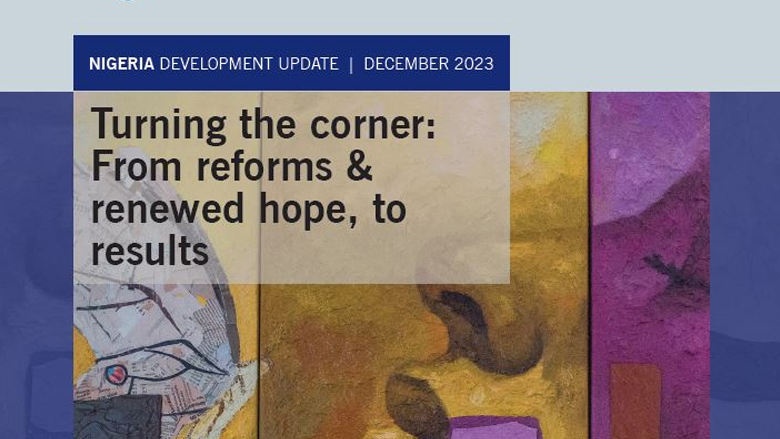
NIGERIA DEVELOPMENT UPDATE (NDU) - december 2023 Edition:
-
Turning the Corner: From reform and renewed hopes, to resultsNIGERIA DEVELOPMENT UPDATE, DECEMBER 2023
Important reform decisions have been taken for Nigeria to avoid a fiscal cliff, and temporary compensation is being provided to help the poorest and most vulnerable households. In May and June 2023, the incoming administration undertook two critical policy decisions, which have resulted in price and exchange rate adjustments in the second half of the year. Targeted cash transfers are helping to cushion the adjustment to higher gasoline prices. On FX policy, progress has been made on implementing the policy for a unified, transparent, and flexible exchange rate. On fiscal policy, budget planning for the next several years is consistent with sustaining the fiscal savings from the subsidy reform and mobilizing more revenues. Inflation remains at record high levels for Nigeria. However, the reforms are yet to be completed to fully realize the economic benefits. The near-term priority is to enhance the reform effort with a closely coordinated mix of fiscal, monetary, and FX policies to reduce inflation and achieve macroeconomic stabilization. The economic outlook for Nigeria in the short to medium term hinges on the continuation and effectiveness of its macroeconomic stabilization agenda. Successful implementation of the initiated reforms will be the first step toward improving Nigeria’s growth prospects. With implementation of these first macroeconomic stabilization reforms, the economy is expected to grow at an average annual rate of 3.5% during 2023–2026, or 0.5 of a percentage point higher than in a scenario in which the reforms had not been implemented.
-
Seizing the OpportunityNIGERIA DEVELOPMENT UPDATE, JUNE 2023
Previous editions of the Nigeria Development Update (NDU) have called for a business unusual approach: bold and urgent policy reforms on key areas to enable Nigeria to break the cycle of low growth, high poverty, slow job creation, and fragility. Although external shocks have played a part, it is domestic policies which played the major role in holding back Nigeria’s economic performance and resilience to further external shocks. The previous mix of fiscal, monetary, exchange rate and trade policies, including the naira redesign program, did not deliver the desired improvements in growth, inflation, and economic resilience. This edition of the NDU titled ‘Seizing the Opportunity’ acknowledges the recent major reforms that the new administration has initiated, such as the elimination of the petrol subsidy and reforms in the FX market. These are crucial to begin to rebuild fiscal space and restore macroeconomic stability, and they will lift Nigeria’s growth potential: the economy is expected to grow at 3.3% in 2023, 3.7% in 2024, and 4.1% in 2025. While inflation will be higher in 2023, it will be lower in 2024 and 2025 if the right policy mix is sustained. Compensating transfers will be essential in helping to shield Nigerian households from the initial price impacts of the subsidy reform. Without compensation, many households could be pushed into poverty by higher petrol prices and forced to resort to coping mechanisms with long-term adverse consequences, such as not sending children to school, or not going to health facilities to seek preventative healthcare. To build on the immediate, major reforms, and seize the opportunity to rise to its potential, Nigeria still has other urgent choices to make. Persistently high inflation and low fiscal revenues continue to hinder economic growth. It remains imperative to change course, as sluggish economic growth risks becoming deeply entrenched through low investment due to weak macroeconomic conditions, escalating poverty, and fragility. The removal of the petrol subsidy and the FX reforms have opened a window of opportunity that, if effectively seized by sustaining and building on these reforms, could have a transformative impact on the lives of millions of Nigerians and establish a solid foundation for sustained growth. The report recommends specific, critical measures to build on the new government’s bold start in implementing critical reforms, to ensure that Nigeria rises to its full potential. These include: (1) restoring macroeconomic stability by increasing non-oil revenue, reducing inflation through a sequenced and coordinated mix of trade, monetary and fiscal policies, and completing the FX reform, (2) expanding social protection to protect the poor and most vulnerable, and (3) developing and communicating how, as fiscal space recovers, resources will be redirected over time to meet urgent development challenges.
-
Nigeria’s choiceNIGERIA DEVELOPMENT UPDATE, DECEMBER 2022 2022
Nigeria is in a challenging and deteriorating economic situation with lowered growth projections. To reduce its vulnerability to crisis and rise to its potential, Nigeria has to choose among markedly different paths. Policy reforms are available to help the country overcome the current challenges and set the foundations for rising to its potential. These reforms are needed in three key areas: restoring macroeconomic stability; boosting private sector development and competitiveness; and expanding social protection to protect the poor and most vulnerable.
-
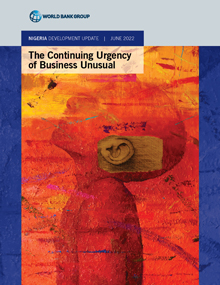 The Continuing Urgency of Business UnusualNIGERIA DEVELOPMENT UPDATE, JUNE 2022
The Continuing Urgency of Business UnusualNIGERIA DEVELOPMENT UPDATE, JUNE 2022This latest edition of the NDU says that inflation in Nigeria, already one of the highest in the world before the war in Ukraine, is likely to increase further due to the rise in global fuel and food prices caused by the war. And that is likely to push an additional one million Nigerians into poverty by the end of 2022, on top of the 6 million Nigerians that were already predicted to fall into poverty this year due to the rise in prices, particularly food prices. The report also states that the inflationary pressures will be compounded by the fiscal pressures Nigeria will face this year because of the ballooning cost of gasoline subsidies at a time when oil production continues to decline.
-
 Time for Business UnusualNIGERIA DEVELOPMENT UPDATE, NOVEMBER 2021
Time for Business UnusualNIGERIA DEVELOPMENT UPDATE, NOVEMBER 2021The report, titled “Time for Business Unusual" highlights urgent policy priorities that can be implemented over the next 3 to 6 months in four key areas: (1) eliminating the PMS subsidy while protecting poor and vulnerable households from any inflationary impact; (2) reducing inflation through a coordinated mix of exchange rate, trade, monetary and fiscal policies; (3) catalyzing private investment by enhancing foreign exchange management, easing trade restrictions, and fostering a better business environment; and (4) addressing fiscal pressures through enhanced domestic revenue mobilization and reducing the reliance on CBN deficit financing.
-
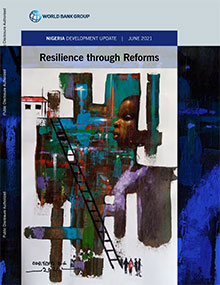 Resilience through ReformsNIGERIA DEVELOPMENT UPDATE, JUNE 2021
Resilience through ReformsNIGERIA DEVELOPMENT UPDATE, JUNE 2021In 2020, Nigeria experienced its deepest recession in four decades, but growth resumed in the fourth quarter as pandemic restrictions were eased, oil prices recovered, and the authorities implemented policies to counter the economic shock. As a result, in 2020 the Nigerian economy experienced a smaller contraction (-1.8 percent) than had been projected when the pandemic began (-3.2 percent). As part of its response, the government carried out several long-delayed policy reforms, often against vocal opposition. Notably, the government (1) began to harmonize exchange rates; (2) began to eliminate gasoline subsidies; (3) started adjusting electricity tariffs to more cost-reflective levels; (4) cut nonessential spending and redirected resources to COVID-19 (coronavirus) responses at both the federal and the state levels; and (5) enhanced debt management and increased public-sector transparency, especially for oil and gas operations. By creating additional fiscal space and maximizing the impact of the government’s limited resources, these measures were critical in protecting the economy against a much deeper recession and in laying the foundation for earlier recovery. However, several critical reforms are as yet incomplete, which threatens Nigeria’s nascent recovery. In the baseline scenario, Nigeria’s economy is expected to grow by 1.8 percent in 2021. Despite the current favorable external environment, with oil prices recovering and growth in advanced economies, reform slippages would hinder the renewed economic expansion and undermine progress toward Nigeria’s development goals. In a risk scenario, in which the government fails to sustain recent macroeconomic and structural reforms, the pace of economic recovery would slow, and GDP growth couldbe just 1.1 percent in 2021.
-
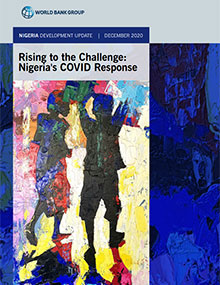 Rising to the Challenge: Nigeria's COVID ResponseNIGERIA DEVELOPMENT UPDATE, DECEMBER 2020
Rising to the Challenge: Nigeria's COVID ResponseNIGERIA DEVELOPMENT UPDATE, DECEMBER 2020In 2020, Nigeria’s economy is expected to experience its deepest recession since the 1980s due to the COVID-19-related disruptions, notably lower oil prices and remittances, enhanced risk aversion in global capital markets, and mobility restrictions. In our baseline scenario—which assumes further macroeconomic reforms and a gradual recovery in oil prices—Nigeria’s gross domestic product (GDP) is projected to contract by about 4 percent in 2020, growing modestly by 1.1 percent in 2021, and then recovering gradually towards the estimated population growth rate of 2.6 percent. With the rate of economic growth remaining below the population growth rate, per-capita incomes would continue declining and better full-time jobs will be much harder to find. Below, we provide highlights on how the COVID-19 crisis has impacted Nigeria’s economy.
-
Nigeria in Times of COVID-19 - Laying Foundations for a Strong RecoveryNigeria Development Update, June 2020
This edition of the Nigeria Development Update provides policy options that Nigerian policymakers may consider in order to mitigate the impacts of COVID-19 (coronavirus) and lay the foundation for a strong recovery. These policy options are organized in the five areas: 1. Containing the COVID-19 outbreak and preparing to deal with a more severe outbreak; 2. Enhancing macroeconomic management to boost investor confidence; 3. Safeguarding and mobilizing revenues; 4. Reprioritizing public spending to protect critical development expenditures; 5. Supporting economic activity and provide relief for poor and vulnerable communities.
-
Jumpstarting Inclusive Growth : Unlocking the Productive Potential of Nigeria’s People and Resource EndowmentsNigeria Development Update, December 2019
Nigeria continues its recovery from the 2016 recession, sustaining an estimated 2 percent growthrate in 2019. The collapse of global oil prices during 2014–16, combined with lower domestic oil production, led to a sudden slowdown in economic activity. Nigeria’s annual real GDP growth rate, which averaged 7 percent from 2000 to 2014, fell to 2.7 percent in 2015 and to -1.6 percent in 2016. Growth rebounded to 0.8 percent in 2017, 1.9 percent in 2018, and then plateaued at 2 percent in the first half of 2019, where it is expected to remain for the rest of the year.
-
Water Supply, Sanitation and Hygiene – A Wake-up CallNigeria Biannual Economic Update, April 2019
Nigeria's emergence from recession remains slow: real GDP grew by 1.9 percent in 2018. While this was above the 0.8 percent growth of 2017, it was below the population growth rate, government projections and pre-recession levels. The oil and gas sector reverted to contraction from the second quarter of the year and the non-oil economy was thus the main driver of growth in 2018. While agriculture slowed down significantly due to conflict and weather events, whose effects were not counteracted by direct interventions by the Central Bank of Nigeria (CBN), non-oil, non-agricultural growth, which remained negative up to the third quarter of 2017 strengthened through 2018 - but remained weak – with services (primarily ICT) resuming as the key driver. As the oil sector is not labor-intensive, and the non-oil economy was still relatively weak, nearly a quarter of the work force was unemployed in 2018; and another 20 percent under-employed. With 3.9 million net entrants into the labor force (now 90.5 million people) during 2018 (up to September) (4.5 percent growth), but virtually no growth in the stock of jobs, unemployment rose by 2.7 percentage points since end-2017, and more than doubled compared to the pre-recession levels (9.9 percent in Q3 of 2015).
-
Investing in Human Capital for Nigeria's FutureNigeria Biannual Economic Update, Fall 2018
The Nigerian economy remains dependent on the small oil sector (under 10 percent of GDP) for the bulk of its fiscal revenues and foreign exchange earnings. This makes Nigeria’s balance of payments and government budgets vulnerable to volatilities in oil prices. Indeed, growth and investment in Nigeria have been negatively impacted by repeated oil-price driven boom-bust cycles. The oil price shock of late 2014 and its aftermath pushed the economy into recession and precipitated a major budgetary crisis at the national and state levels which brought to light the longer-term trend of weak domestic revenue mobilization. Nigeria’s weak revenue mobilization has major implications for growth and development, including for improving its dire social service delivery outcomes. Thus, the country needs to take concrete steps to break its oil dependency to improve its economic and social outcomes. Oil revenues are recovering with increasing oil prices, but distributions to the tiers of government are constrained by the unbudgeted fuel subsidy and other deductions. The fuel subsidy, no longer an explicit first line deduction from oil revenues, mostly benefits the affluent and it is also widely-known that a portion of Nigeria’s imported petrol is smuggled out to neighboring countries where petrol is more expensive. The constrained net oil revenues, combined with non-oil revenues that are constrained by limited tax policy reforms and are thus stagnated (relative to GDP), limit overall revenue realization, thus constraining budget execution and the build-up of fiscal buffers. The growth in the public debt stock between the first half of 2017 and the first half of 2018 was mainly attributable to the increased Eurobond issuances, some of which were used to liquidate costlier domestic short-term debt. The Nigeria Economic Recovery and Growth Plan (ERGP) 2017-2020 aims to achieve macroeconomic stability and economic diversification and there is thus the need to accelerate its implementation progress. The special focus topic for this report is on human capital development in Nigeria. Studies show that between 10 and 30 percent of the differences in per capita income between countries can be attributed to human capital. The economic burden of malaria alone in Nigeria, accounting for direct and indirect costs excluding mortality, is estimated at 13.5 percent of GDP. However, in the quest for sustainable growth, Nigeria, like many other countries, has underinvested in human capital. While physical capital remains critical, it does not fully account for improvements in growth.
-
Connecting to CompeteNigeria Biannual Economic Update, April 2018
The Nigeria Biannual Economic Update is a product of the staff of the World Bank and has three broad aims. First, it reports on the key developments in the Nigerian Economy in the recent past Secondly, it summarizes the likely economic outcomes in the short-to-medium term, given the policy developments, and highlights key short-term risks and upside potentials. Finally, the Update provides a more in-depth examination of selected highly relevant economic issues. The Nigeria Biannual Economic Update is intended for a wide audience, including policy makers, business leaders, financial market participants, and the community of analysts and professionals engaged inNigeria’s economy.
-
The Case for Sustaining State Fiscal ReformNigeria Biannual Economic Update, October, 2017
Nigeria's economy recorded positive growth (0.6 percent year-on-year) in the second quarter of 2017, after contracting for 5 consecutive quarters, and growth is expected to reach 1 percent in 2017, contingent on sustained recovery of oil production. Although the negative spillovers fromlower oil revenue have diminished with the increased availability of foreign exchange,macroeconomic imbalances remain and severe revenue shortfalls continue to hamperbudget implementation. Nigeria experienced its first recession in over two decades in 2016, when the economy contracted by 1.6 percent due to negative oil price and oil production shocks,which spilled over to the non-oil sectors. Oil GDP shrank by 14.4 percent, and non-oilGDP contracted by 0.2 percent. Oil exports plummeted by 25 percent in 2016 (in US dollar terms);however, imports contracted even faster (33 percent) due to constraints on foreign exchange,resulting in a positive current account balance (0.7 percent GDP) in 2016.
-
Fragile RecoveryNigeria Bi-Annual Economic Update, April 2017
This economic update provides an overview of recent developments in the Nigerian economy.Low oil revenues and the lack of major tax policy reforms to significantly increase non-oil revenues led to large revenue shortfalls at all levels of governmentin 2016. Monetary policy remained accommodative, with broad money growth at 18.5 percent, driven by increased lending from the Central Bank to the Government to finance the budget deficit. After a sharp depreciation of the exchange rate following the June 2016 liberalization of the Naira,the Central Bank of Nigeria (CBN) maintained theinterbank exchange rate at around N 305 per USD. The chapter second describes the World Bank's view on Nigeria's economic outlook for 2017. The chapter third summarizes the findings of a forthcoming Bank report Toward Sustainable Growth in Nigeria: Empirical Analysis and Policy options, which analyzes the patterns of economic growth in Nigeria; the underlying determinants of growth from both a macro and micro perspective; and policy priorities tosupport higher growth. In addition, analysis of constraints to doing business and the impact of current trade policies highlights the need to improve access to finance, improve the reliability of power supply, and adjust trade policies to promote productivity growth.
-
Nigeria Economic Report (NER)November 2015
The Nigeria Economic Report (NER) is a regular publication of the World Bank. Each edition provides an overview of recent macroeconomic developments and devotes special attention to a topic of particular relevance or urgency. In this edition the macroeconomic overview is followed by both a detailed analysis of the country’s fuel subsidy and an assessment of the current state and economic potential of its natural gas sector. 2015 has been a momentous year for Nigeria. The general elections held in March brought about the first democratic transition of power from a ruling party to an opposition party, heightening expectations for meaningful political change. The new Government is taking power during a very challenging time, however, marked by a sharp decline in global oil prices and continuing violence in the country’s northeast. This creates a difficult context for realizing the new administration’s ambitious reform agenda for job creation, the power sector, oil and gas, agriculture, and public administration. Chapter two of the report analyzes the costs and benefits of Nigeria’s fuel subsidy, including their implications for low-income households. Fuel subsidy costs are expected to amount to 18 percent of government oil revenues in 2015, and this share could increase to more than 30 percent by 2018 even if oil prices remain low. There is a general consensus that increasing the supply of power in Nigeria is critical to the future development of the country. The success of the current plans to boost generation capacity will hinge on the development of the natural gas sector. Nigeria is endowed with substantial natural gas reserves, but major reforms will be necessary to attract the investment necessary to harness the potential of the natural gas sector to supply the domestic energy market. Chapter three of this report summarizes the current regulatory situation in the natural gas sector and outlines potential avenues for reform.
-
Nigeria Economic Report (NER)July 2014
The Nigerian Economic Report (NER) is a regular publication of the World Bank. Each edition of the NER includes a macroeconomic overview and gives special attention to an additional topic of high policy relevance. In addition to macroeconomic performance, this edition of the NER focuses on recent releases of new statistical information. First, newly re-based Gross Domestic Product figures indicate a larger, more diversified, and complex economy in Nigeria than was hitherto reported, with significant contributions to growth coming from manufacturing and some services not captured in previous data. Second, Chapter 2 provides an analysis of recent NBS GHS household survey data, which supports the hypothesis that the larger NBS HNLSS survey of 2009/2010 may have underestimated consumption.
-
Nigeria Economic Report (NER)May 2013
The Nigeria economic report represents a new World Bank product intended to be produced on a biannual basis. Each report will provide an assessment of the current economic situation in the country and give special attention to selected topics of high policy relevance for Nigeria. This first Nigeria economic report will give some attention to longer term trends in the country, including the puzzle of why a decade of rapid Gross Domestic Product (GDP) growth by official statistics, concentrated in the pro-poor areas of agriculture and trade, did not bring stronger welfare and employment benefits to the population. The second chapter of this Report turns to the question of Government oil revenues and related future budgetary challenges to the country. Due to relatively slow expected growth in oil production and the real appreciation of the naira, the share of Government oil revenues in GDP fell significantly in 2012, and will likely continue to fall in the medium term. The third chapter addresses a question that has been at the center of many recent controversies and initiatives in Nigeria: fiscal federalist relations. The chapter argues that the current basic model of fiscal federalism may actually suit Nigeria very well, and could be consistent with the rapid successful development of the country. But the success of this model will depend on developing mechanisms for better cooperation between the federal and state governments in three key areas: (a) effective macroeconomic management of the country's oil wealth, (b) the coordination of fiscal policies, particularly for the connectivity of markets and improvement of public services, and (c) the realization of national standards for accounting and disclosure of information.

